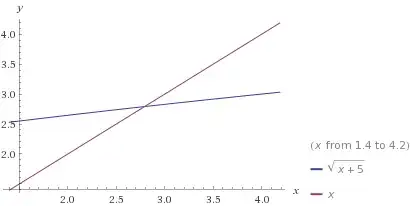Let $x_1 = a, x_{n+1} = \sqrt{5 + x_n}$. Then
A. there exists $a \geq 0 $ such that sequence $x_n$ is unbounded.
B. for any $a \geq 0 $ sequence has a limit
The answer is supposed to be B, but I believe that it's wrong, i.e. the correct answer is A. The easiest way to see this is to look on the figure of intersection of $y=x$ and $y = \sqrt{5+x}$. Start at any point to the right of the intersection, and you'll go to infinity.
My question: am I right, or did I miss something?